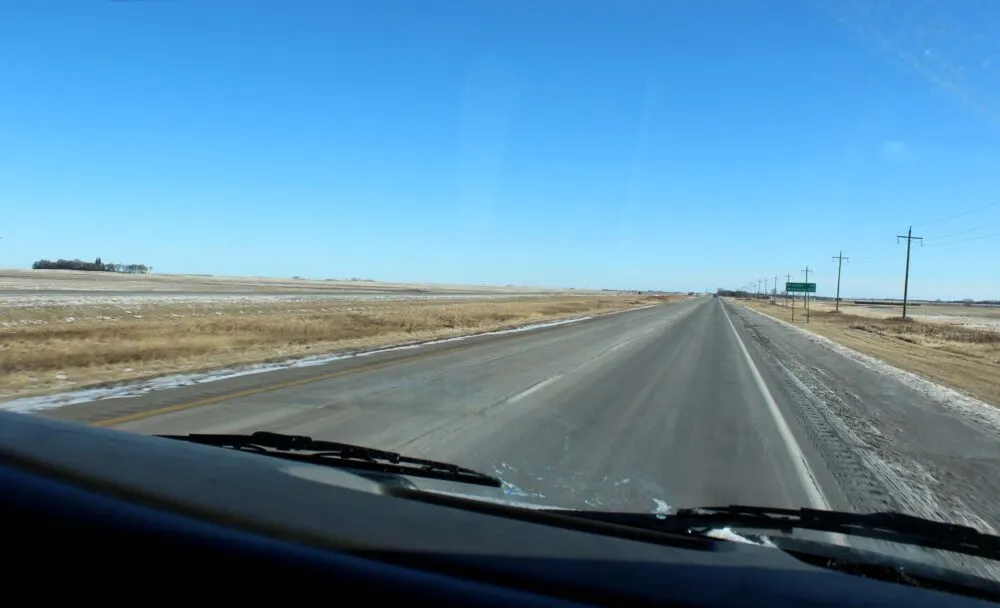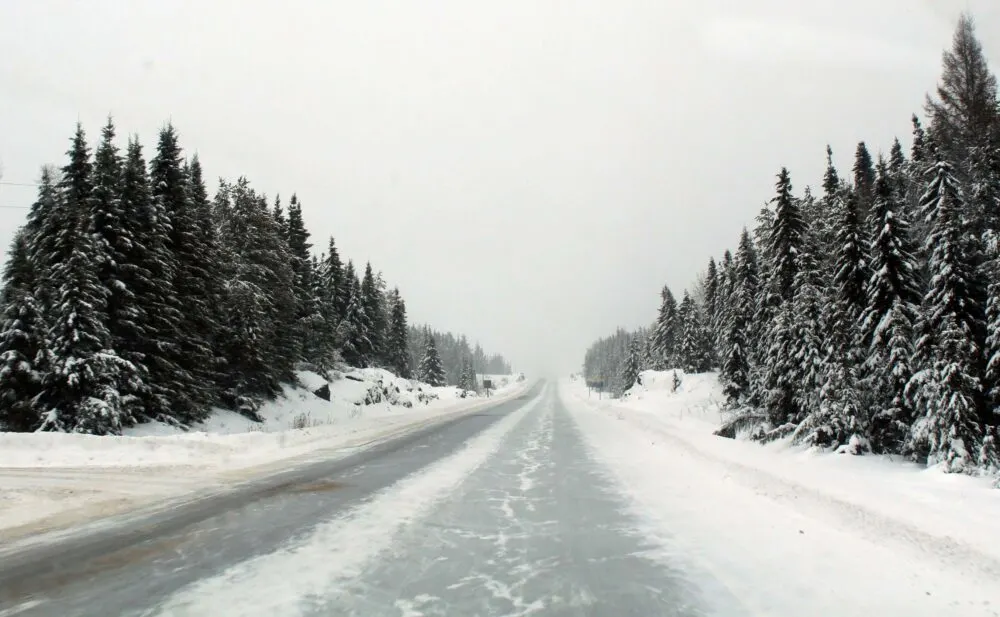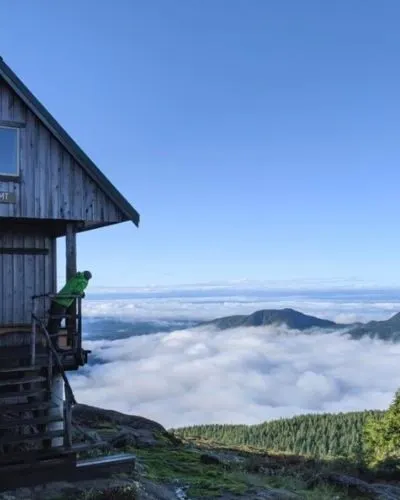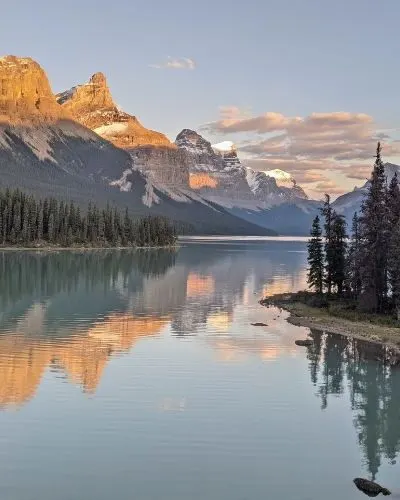Experience the beauty of the coldest season with a winter road trip in Canada. Enjoy uncrowded destinations, cheaper prices and wonderfully snowy scenery.
Of course, winter road trips in Canada present more challenges than their summer counterparts. Navigating icy roads and preparing for colder temperatures require additional planning to ensure a safe and enjoyable journey.

After living in Canada together for 10+ years, we’ve embarked on many winter road trips.
The longest and most difficult was a 4700km two-week December road trip across Canada. We experienced sun, snow, ice, blizzards, high winds, slush and temperatures down to -35c.
Here’s everything I would have wanted to know before setting out that epic winter road trip in Canada.
There are affiliate links in this post. If you make a qualifying purchase through one of these links, I may receive a small commission at no extra cost to you.

Be prepared for short driving days
Daylight is limited in the winter. I don’t know about you, but I hate driving in the dark, especially during winter when blizzards, black ice and freezing rain is all possible.
When we drove across Canada in winter a few years ago, we drove when the sun was coming up and generally stopped soon after it went down. This reduced our driving window to approximately 7am – 4pm, depending on time zone and location.
If you have a similarly long trip to make in winter, don’t forget that you’ll probably pass through a few different time zones. Remember that the time of sunrise and sunset will vary as you drive across different provinces and territories.

Pick your destinations carefully
You’ve probably already guessed, but due to adverse weather conditions and lack of visitors, many attractions in Canada have either reduced hours or are completely closed in winter.
A lot of provincial and territorial parks will have limited access or will be completely closed to visitors.
Don’t worry, however, there are still places to visit and things to see but you need to plan a bit more carefully. Hot springs, in particular, are a great place to stop when road tripping Canada during winter.

Be aware of limited roadside facilities
In a similar theme to the above advice, many roadside facilities are shut during winter. This includes things like toilets, visitor centres and rest stops.
Typically, the buildings are completely locked (we found Ontario the worst for this). Quite often, the road leading to these facilities isn’t snowploughed at all.
It is also important to know that some gas stations are closed during winter. On our cross Canada road trip, this was only a problem on Highway 1 between Kenora and Sault St. Marie. I definitely wouldn’t advise risking a low gas tank in this area.
It’s a good idea, in general, to keep your vehicle topped up with gas to prevent the fuel-line freezing up during winter road trips.

Don’t rush on your winter road trip in Canada
I know it almost goes without saying, but on a winter road trip in Canada, you MUST be prepared to drive slower than normal.
Slippery roads, reduced visibility, heavy snowfall and black ice may not just slow progress down, but force you to pause or stop the trip completely.
In extreme conditions, highways are sometimes closed. For this reason, plan plenty of extra time to get to your destination(s).
To put this into perspective, consider that some people drive across Canada in summer within just four (very long) days. In winter, this would be an unrealistic, and potentially dangerous, challenge.

Unexpected winter road trip hazards
When heading out to drive across Canada in winter, I anticipated tough road conditions and weather. Some things, however, I did not think about were:
- Road signs can become completely covered in snow, making navigation sometimes difficult. This shows exactly why it is useful to have both a physical map (I personally love Backroad Mapbooks) and offline access to Google Maps
- Despite being Canada’s major road across the country, Highway 1 doesn’t necessarily have phone signal all the way along it. There is intermittent service through the Rockies and also from Wawa to the outskirts of Sault St. Marie
- High winds can cause snow drifts in unexpected places. Be careful because snow drifts can be surprisingly deep and make for difficult driving
- Most of Highway 1 across Canada is double lane separated highway. There are, however, large sections in Northern Ontario and smaller stretches in British Columbia that are not. In these areas, it is easy to be momentarily blinded by snow flurries caused by oncoming vehicles (especially trucks).

Must have items for any winter road trip in Canada
Aside from good winter tires, there are a few other crucial items required for winter road trips in Canada.
I’ve also added a couple of extras that we found very helpful during our long trip across Canada.
Shovel and tow rope
While you hope not to use them, a shovel and tow rope are essentials for winter road trips in Canada.
Our shovel has come in handy a few times over the years. We’ve had to dig ourselves out of a few unploughed parking lots, for example.
For our trip across Canada, we purchased an avalanche shovel. Usually carried while backcountry skiing, avalanche shovels are lightweight and pack down small. We still use it today and it fits nicely into our Toyota Echo.
Jumper cables
Winter weather isn’t kind to car batteries, to say the least. Be sure to carry some jumper cables, just in case.
Luckily, we’ve never had to use jumpers on our vehicle but we have helped half a dozen other people over the years. On one memorial occasion, we were just a few blocks from Niagara Falls.
Lots of windscreen washer fluid
On our big cross Canada road trip (4700km!), we used over 20 litres of windscreen (or windshield) washer fluid. And that was in relatively good winter weather.
With so much snow, ice, dirt and general grime splashing up on the windscreen, washer fluid is absolutely essential during winter road trips to keep clear visibility. There were times when we had to use it after every passing vehicle.
Make sure you buy winter windscreen washer fluid rated to -40c or lower. Consider also replacing your windscreen wipers if they are not winter-rated.
Emergency kit
No matter how long your road trip is, bring an emergency kit. It should include:
- Blanket(s)
- Food
- Gloves and warm hat
- Wind-up flashlight (torch) or headlamp
- First aid kit
- Extra clothing
- Water (see below)
This equipment could save your life if road conditions force you to be stuck in your vehicle.
Clothing-wise, be sure to have lots of different layers. When driving, the vehicle will be warm and hence less clothing will be needed.
But if your vehicle gets stuck in adverse weather, more layers will quickly be required as well as warm, waterproof winter gloves and boots.

Insulated flasks
Cold weather freezes liquids. Ergo, water is harder to store on a winter road trip. The solution, however, is easy. Insulated flasks.
Used most often for coffee and tea, you can also use insulated flasks to keep water and other liquids cold (but not frozen) in freezing conditions.
One morning, we had absolutely nothing unfrozen to drink except what was in our Hydroflask. Be sure to have at least one insulated flask in your vehicle.
Cooler
Following on from the last suggestion, a coolers can be useful on a winter road trip in Canada. If possible, store any kind of fresh food in one of these to give it a little more protection against the cold temperatures.
Of course, always carry some dried food (granola bars, nuts) that will still be edible even if they happen to freeze and defrost a few times.

And remember…
To still have fun! Winter road trips in Canada are more challenging, however, it can be an enjoyable experience.
Everything looks somehow even more beautiful under cover of snow. Canada is truly a winter wonderland in every sense.
Be sure also to read this winter driving advice and prepare your vehicle properly before heading out on the road.

Other winter posts you may find helpful
The Complete Guide to Travelling Canada in Winter
65 Cool Things to Do Across Canada in Winter
8 Must See Places On A Winter Road Trip Across Canada
What to Wear in Canada in Winter: A Complete Guide
Snowshoeing 101: A Beginner’s Guide
Adventure in your inbox
Subscribe to our monthly email newsletter and receive a round-up of our latest outdoor adventures plus other exciting beyond the beaten path destinations
We never share your information with third parties and will protect it in accordance with our Privacy Policy
Check out these recently published posts:

One half of the Canadian/British couple behind Off Track Travel, Gemma is happiest when hiking on the trail or planning the next big travel adventure. JR and Gemma are currently based in the beautiful Okanagan Valley, British Columbia, Canada




Barney Samuel
Friday 19th of November 2021
Hey! My girlfriend and I are embarking on this journey on Monday. I’m wondering whether it’s a good idea to buy snow chains before leaving Montreal for whistler. Your articles given me so much confidence in the journey. Knowing about the water freezing overnight… priceless info!!
Gemma
Friday 19th of November 2021
Hi Barney,
If you're moving to BC, I would 100% buy snow chains. Otherwise, it really depends on what your plans are. We didn't need to use snow chains on our winter road trip across Canada as we had the time to stop and wait out the worst snow storms. If you're in a rush, I'd suggest snow chains for sure.
Just in case you're not aware of the situation, you should know that all four highways from the BC interior to the coast (which includes Whistler) are closed. At this time, you would have to drive through Washington and then cross the border near Vancouver and then drive up to Whistler via Squamish. This may change in the coming days. The most direct route for you normally would be via Highway 99 from the east, but there were multiple mudslides. But it doesn't sound as bad as Highway 1 and 5, where parts of the highway were destroyed completely. Be sure to check DriveBC often and also weather forecasts.
Sid
Wednesday 17th of November 2021
Hey Gemma, Great post and very useful info. I am a new Canadian resident and started doing road trips this summer and I can't wait to explore more of Canada during the winter. I think am gonna start prepping based on your recommendations here. :)
ps: the link for "winter driving advice" is not working. I think the page has moved to this new URL: https://www.caa.ca/driving-safely/winter-driving/
Thanks!
Gemma
Thursday 18th of November 2021
Hi Sid,
I'm glad you found this post helpful! I really appreciate the heads up that the link has changed. Now fixed! Thank you!
Daneille
Friday 13th of November 2020
Hi- Thanks for the blog- I am about to make the journey from Toronto to Kelowna just after the Christmas holiday's! Some great tips. Thanks for sharing!
Gemma
Friday 13th of November 2020
You're welcome Daneille! Have a safe trip
Anoli
Wednesday 1st of April 2020
Is early April considered winter weather to drive across BC, passed Regina, through southern Manitoba?
Gemma
Thursday 2nd of April 2020
Hi Anoli,
You could still experience winter weather conditions driving through the mountains and Prairies at this time. Some of the issues I mention in this post are still completely true (hazards, closed facilities) but some are less applicable (short driving days for example.) We drove through heavy snow in Banff in mid April one year. It disappeared quicker than it could have done during Dec/Jan/Feb, however, due to the fluctuating conditions.
Sultan
Tuesday 5th of November 2019
Hi i am planning on traveling to Fort Smith North West territories next week from Winnipeg so how do you think i should plan i have to be there by November 12? What should I keep and how could be the road conditions? Thanks
Gemma
Monday 11th of November 2019
Hi Sultan,
Wow, that is a long road trip! At almost 2,600km, I would plan to be driving for at least five days, with at least a day (or even two) in case of delays. I would definitely keep a close eye on weather conditions leading up to your trip. Sorry I didn't see your message until now, I've been travelling without signal for over a week.